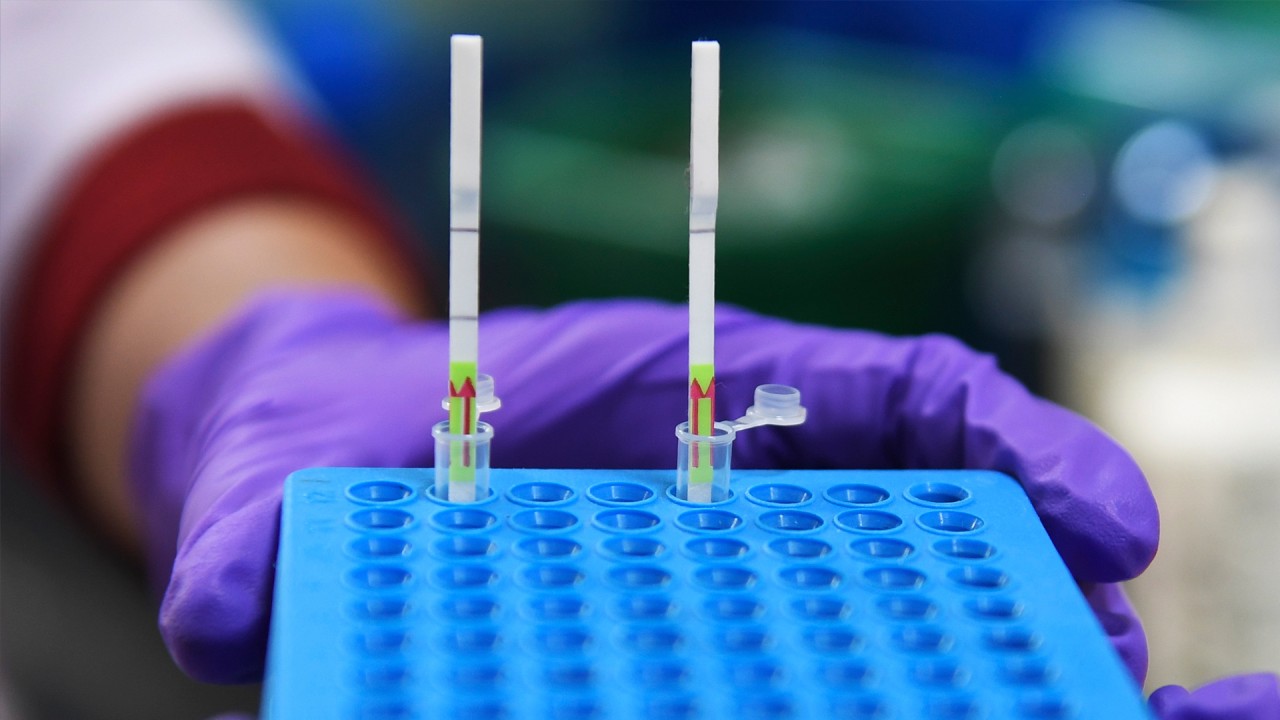
02:16
India to roll out quick and cheap paper Covid-19 test

Genscript Biotech’s shares jumped by the most in more than 15 months in Hong Kong after US regulators approved the use of the company’s test kit on an emergency basis to detect neutralising antibodies in people infected by Covid-19.
“The cPass kit is the first commercially available test to specifically detect neutralising antibodies in patient samples without the use of live virus,” the Chinese gene and cell therapy company said in a filing to Hong Kong stock exchange late on Friday.
The test measures the presence of neutralising antibodies – widely recognised biomarkers of immunity – in patients recovering from the SARS-CoV-2 virus, or after having received a vaccine. Tests with the kit can be completed in around an hour in most standard laboratories, Genscript said, adding it does not require biosafety containment for testing.
Genscript surged as much 18 per cent to HK$13.36 and closed at HK$12.58 for an 11.3 per cent advance, the biggest one-day win since end-July 2019.

02:16
India to roll out quick and cheap paper Covid-19 test
Infection with viruses including SARS-CoV-2 causes the body to produce two kinds of antibodies – binding and neutralising. The former attach themselves to viral proteins, but they do not “neutralise” the virus or prevent infection, while the latter do both. Testing for neutralising antibodies plays an important role in research on the virus, tracking infections and vaccine development.
“The ability to detect neutralising antibodies can help us gain additional insight into what the existence of antibodies may mean for patients as we continue the fight against Covid-19,” said Tim Stenzel, a director at Food and Drug Administration. “There are still many unknowns about what the presence of SARS-CoV-2 antibodies may tell us about potential immunity, but today’s [Friday] authorisation gives us another tool to evaluate those antibodies as we continue to research and study this virus.”
The previous “gold standard” for detecting neutralising antibodies involves infecting cells with live viruses in highly contained biosafety facilities and takes several days to complete.
“Unlike commercially available antibody-based tests that are routinely used for detecting prior exposure to the virus, the kit can assess both prior exposure and the presence of neutralising antibodies in convalescent patients,” said David Martz, a vice-president responsible for new product management at the Nanjing-based company.
Genscript’s cPass test kit can be used to screen different species of animals for SARS-CoV-2 infection without modification, said Linfa Wang, director of Duke-National University of Singapore’s emerging infectious diseases programme and co-developer of the kit.
Genscript’s Dutch partner Innatoss Laboratories launched the product in mid-September, after performing a study in Kessel, a city in southern Netherlands severely affected by the first wave of Covid-19.
In 90 per cent of the cases, the binding antibody levels dropped significantly over time, while neutralising antibodies were stable in 70 per cent of those tested, Innatoss said at the time of the launch. It however did not say how many people had been tested.
“Similar to the Covid-19 vaccine market, the test kit market can be huge too … stepping into this area could bring a big boost to Genscript’s financial performance,” said Daiwa Capital Markets analyst Dennis Ip. He added that its kit stands out among about two dozen antibody tests approved in mainland China, as it is the only one that can detect neutralising antibodies.
Stephen Sunderland, a Shanghai-based partner at L.E.K. Consulting who focuses on health technology, said Genscript’s new test can improve testing capacity, shorten turnaround times and reduce the costs of large-scale testing. He noted that one area of concern for Genscript is that diagnostic tests are fairly readily and rapidly replicable by the industry.
“Unless there is a very strong intellectual barrier, if Genscript’s test is commercially successful then I’d expect to see further alternatives for that in due course,” Sunderland said.
Genscript provides research services and products to drug developers besides developing industrial enzymes. It has partnered with US-based Janssen Biotech to develop an innovative therapy to fight multiple myeloma, an incurable cancer.
Genscript posted an underlying pre-tax loss of US$78 million in the first half, more than double the US$36.6 million loss in the same period last year. Revenue, however, grew 36.5 per cent year on year to US$166.4 million.